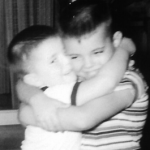Loving & hating – K’doshim
 Two verses in this week’s portion seem to be saying the same thing, one positively, one negatively.
Two verses in this week’s portion seem to be saying the same thing, one positively, one negatively.
The positive verse says, V’ahavta l’re’acha kamocha – “You shall love your neighbour as yourself” (Lev. 19:18). The negative verse is, Lo tis’na et achicha bil’vavecha – “Do not hate your brother in your heart” (Lev. 19:17).
Logically the two duties seem to imply one another. If I love my neighbour, I don’t hate him; if I don’t hate my brother, I love him.
How then can both verses be necessary?
A Chassidic writer says that the Torah is trying to teach us that our love for others must be unconditional. We are not allowed to love people on condition that they are good and law-abiding. Even if they are, God forbid, lacking in righteousness we still have to love them.
We cannot merely say, “I don’t hate my brother, but you can’t expect me to love him. Look at the sort of person he is after all!”
The crucial word is kamocha, “as yourself”. Just as you presume that other people, and God too, will love us warts and all, so we have to love others regardless of their faults and failings.



